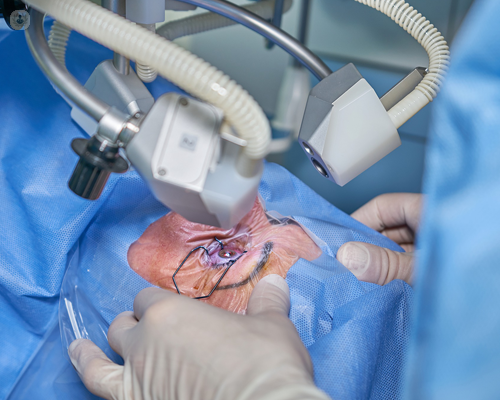What you need to know about cataract surgery
Written in association with:Cataract surgery is a common procedure performed to remove a cloudy lens (cataract) from the eye and replace it with an artificial intraocular lens (IOL).
This surgery aims to improve vision and restore clarity to the eye affected by cataracts. Leading consultant ophthalmologist Mr Prasad Rao goes into expert detail about the procedure in this informative article.

What is cataract surgery?
Cataract surgery is a surgical procedure performed by an ophthalmologist to remove a cloudy lens (cataract) from the eye. During the procedure, the cloudy lens is broken up using ultrasound energy and removed through a small incision in the eye. Once the cataract is removed, an artificial intraocular lens (IOL) is implanted to replace the natural lens and restore clear vision.
What are the indications for cataract surgery?
Cataract surgery is typically recommended when cataracts cause significant vision impairment that affects daily activities such as reading, driving, or seeing clearly at night. Common symptoms of cataracts include blurred vision, glare, halos around lights, and difficulty reading or performing tasks up close.
How is cataract surgery performed?
Cataract surgery is usually performed as an outpatient procedure under local anaesthesia. The steps involved in cataract surgery include:
Anaesthesia
Eye drops or a local anaesthetic injection is administered to numb the eye and surrounding tissues.
Incision
A small incision is made in the cornea to access the cataract.
Lens removal
The cataract is broken up using ultrasound energy (phacoemulsification) and removed from the eye.
IOL implantation
Once the cataract is removed, an artificial intraocular lens (IOL) is inserted into the eye to replace the natural lens.
Closure
The incision is closed with tiny stitches or allowed to self-heal.
What types of intraocular lenses (IOLs) are available for cataract surgery?
There are several types of intraocular lenses (IOLs) available for cataract surgery, including:
- Monofocal IOLs: These lenses provide clear vision at one distance, typically either near or far.
- Multifocal IOLs: These lenses provide clear vision at multiple distances, reducing the need for glasses after surgery.
- Toric IOLs: These lenses correct astigmatism, providing clearer vision for individuals with astigmatism.
What is the recovery process after cataract surgery?
After cataract surgery, patients are usually monitored for a short period in the recovery area before being discharged home. Some common post-operative instructions include:
- Using prescribed eye drops to prevent infection and promote healing.
- Avoiding strenuous activities and heavy lifting for a few days.
- Wearing an eye shield or protective glasses as instructed.
- Attending follow-up appointments with the ophthalmologist to monitor progress and address any concerns.
Are there any risks or complications associated with cataract surgery?
Cataract surgery is generally considered safe and effective, but like any surgical procedure, it carries some risks and potential complications. These may include:
- Infection
- Bleeding
- Swelling or inflammation
- Increased intraocular pressure
- Retinal detachment
- Dislocation of the intraocular lens
However, serious complications are rare, and most patients experience significant improvements in vision and quality of life after cataract surgery.
If you require expert cataract surgery, arrange a consultation with Mr Rao via his Top Doctors profile.


